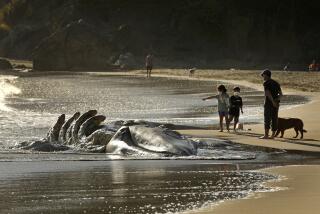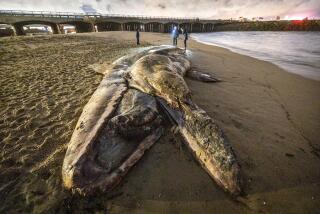Illegal killer whale feeding case ‘worst nightmare,’ biologist says
A prominent marine biologist who was fined $12,500 for feeding killer whales in an effort to lure them closer to her video cameras says the yearslong case was the “worst nightmare I could ever imagine.”
In addition to the fine, Nancy Black -- whose work has appeared on PBS, National Geographic and Animal Planet -- was sentenced to three years’ probation and ordered to serve 300 hours of community service. In exchange, she pleaded guilty to one misdemeanor violation of the Marine Mammal Protection Act by offering food to the orcas, “specifically chunks of gray whale blubber,” according to her plea agreement.
Black, a researcher and co-owner of Monterey Bay Whale Watch, and her supporters have argued attaching a rope to a piece of blubber from a gray whale that had already been killed by orcas did not rise to the level of illegal feeding cited in federal law.
But the biologist had faced a 27-year prison term and $700,000 fine after she was initially charged with multiple felony and misdemeanor counts in 2012. Even under her plea agreement, she could have been fined $100,000.
Black told the Monterey County Herald the case was the “worst nightmare I could ever imagine” and she looked “forward to returning to my passion of studying marine mammals without the distractions that I have had during this case.”
Investigators built their case on footage shot by famed oceanographer Jean-Michel Cousteau, whose crew also attempted to lure the orcas during the feeding in April 2004 in Monterey Bay National Marine Sanctuary. Federal prosecutors forced him to forfeit his vessel, the Manfish, alleging that, like Black, his crew also threaded gray whale blubber on ropes to draw the orcas closer.
The judge also ordered Black to stay 100 yards from the whales -- a punishment her attorneys warned could be used against her by her whale-watching business competitors if a whale swims close by on its own.
jason.wells@latimes.com
Twitter: @jasonbretwells | Facebook | Google+
More to Read
Sign up for Essential California
The most important California stories and recommendations in your inbox every morning.
You may occasionally receive promotional content from the Los Angeles Times.










